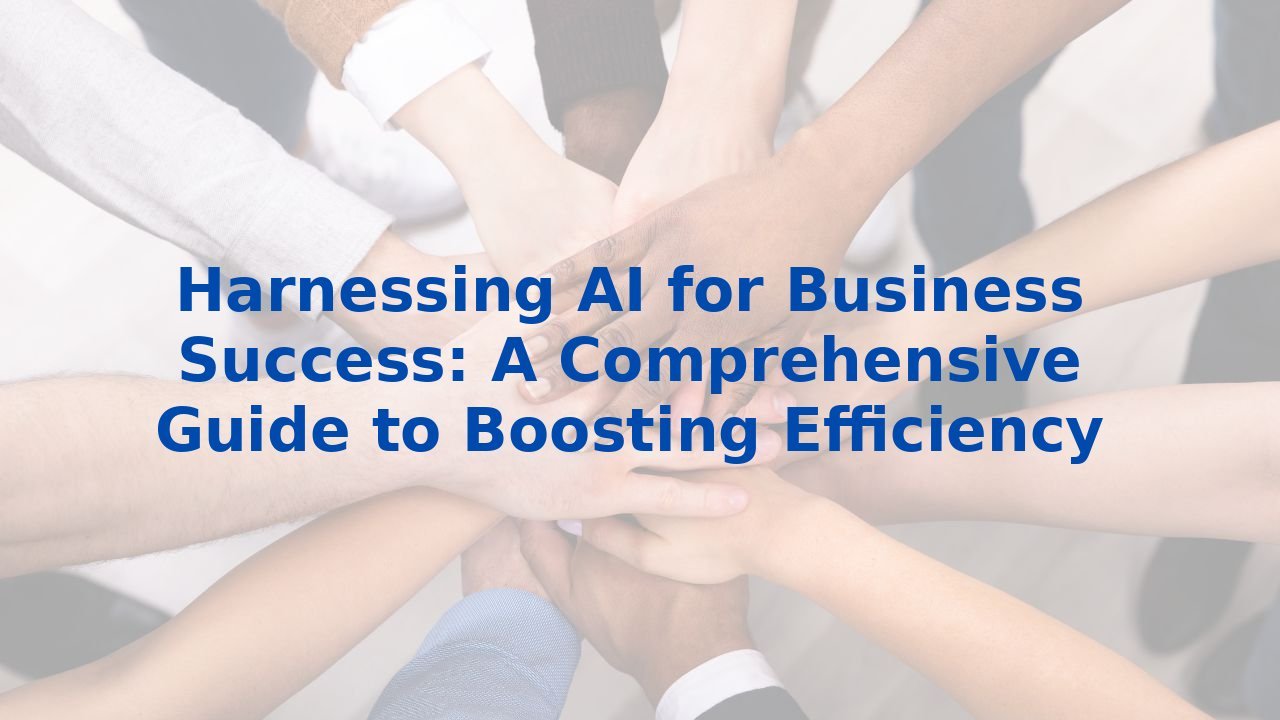Harnessing AI for Business Success: A Comprehensive Guide to Boosting Efficiency
Harnessing AI for Business Success: A Comprehensive Guide to Boosting Efficiency
In an era marked by relentless change, businesses face the constant pressure to innovate and enhance their operational efficiency. The key to thriving in this environment lies in the effective integration of Artificial Intelligence (AI) into everyday processes. This guide explores how AI can transform various business functions, amplifying productivity and paving the way for sustained success.
1. Automating Routine Tasks
A significant advantage of AI is its capacity to take charge of repetitive and mundane tasks. By deploying AI-driven bots and software, businesses can automate processes such as data entry, appointment scheduling, and invoice processing. This transition not only minimizes human errors but also accelerates workflows, liberating employees to engage in higher-value activities that foster growth and innovation.
2. Streamlining Process Optimization
At the heart of improved efficiency is the concept of process optimization. AI serves as a powerful ally in this endeavor by analyzing workflows to uncover bottlenecks and inefficiencies. With actionable insights, organizations can redefine processes, automate menial tasks, and allocate resources more strategically, culminating in a leaner operational framework that drives productivity and reduces costs.
3. Ensuring Quality Control
Maintaining high product quality is vital for any business. AI-powered quality control mechanisms monitor production processes in real time, identifying defects or irregularities promptly. This proactive approach not only enhances product standards but also protects the brand’s reputation, ensuring customer trust remains intact.
4. Enhancing Risk Management
AI’s analytical prowess equips businesses with the ability to foresee and manage risks proactively. By delving into extensive datasets, AI uncovers emerging trends and volatile market conditions, enabling organizations to navigate uncertainties adeptly. This foresight paves the way for informed decision-making and strategic resource allocation, ultimately fostering a more resilient enterprise.
5. Optimizing Supply Chain Management
Supply chains are the lifeblood of many organizations, and the integration of AI can profoundly impact their efficiency. By analyzing historical data and real-time fluctuations, AI can optimize inventory levels, predict demand, and suggest efficient shipping routes. This strategic alignment not only reduces delays but also minimizes carrying costs, creating a responsive and adaptive supply chain ecosystem.
6. Revolutionizing Employee Training and Productivity
AI-driven learning platforms are reshaping how organizations approach employee training. By personalizing learning experiences based on individual styles, these platforms improve knowledge retention and engagement. Furthermore, AI can provide real-time support, offering tailored resources and solutions to employees, thereby enhancing their performance and problem-solving abilities.
7. Strengthening Fraud Detection
Security is paramount in today’s digital landscape. AI’s pattern recognition capabilities can swiftly detect inconsistencies in transaction data or user behavior. By identifying potential fraudulent activities earlier, organizations can act decisively to protect valuable assets and sensitive customer information from breaches.
The Multifaceted Benefits of AI for Business Efficiency
Integrating AI into business workflows comes with several compelling benefits:
- Rapid Analysis of Data: AI facilitates informed decision-making through quick analysis of large datasets. In marketing, for instance, AI can assess customer behavior for targeted campaigns.
- Automation of Routine Responsibilities: AI solutions streamline administrative tasks, allowing employees to concentrate on strategic initiatives.
- Enhanced Customer Experience: AI personalizes recommendations and better predicts customer needs, fostering loyalty and satisfaction.
- Innovative Product Development: AI accelerates innovation by supporting research efforts, from drug development in healthcare to new product design across industries.
- Cost Efficiency: Predictive maintenance driven by AI can foresee equipment failures, curtailing downtime and reducing operational costs.
The Vital Role of Employee Training in AI Success
While the benefits of AI are abundant, the successful integration of AI necessitates a well-trained workforce. Here are key areas of focus:
- Skills Acquisition: Investing in training equips employees with the necessary skills to leverage AI technologies, including machine learning and data analysis.
- Adaptation and Collaboration: Employees must learn how to collaborate with AI tools effectively, enhancing workflows and maximizing efficiency.
- Commitment to Lifelong Learning: AI is an evolving field. Continuous professional development helps employees stay adept with emerging technologies and best practices.
Conclusion
AI is not just a technological advancement; it represents a paradigm shift in how organizations operate. By automating routine tasks, optimizing processes, and enhancing decision-making capabilities, AI can significantly boost efficiency and drive innovation. As organizations endeavor to adopt AI technologies, investing in comprehensive training for employees becomes imperative. This dual approach ensures the full realization of AI’s potential, empowering businesses to thrive in a fast-evolving landscape. By embracing this transformative power, companies can position themselves for ongoing success and growth in their respective markets.



